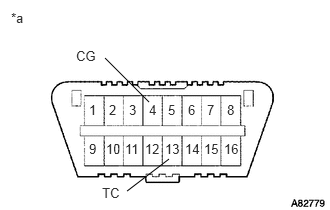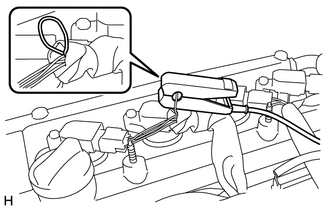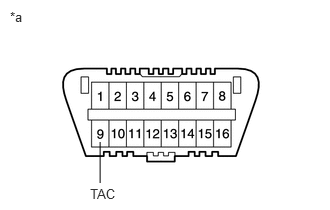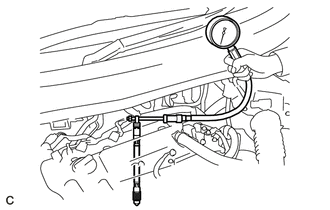2NZ-FE ENGINE MECHANICAL ENGINE ON-VEHICLE INSPECTION
PROCEDURE

 1.INSPECT ENGINE COOLANT
1.INSPECT ENGINE COOLANT

 2.INSPECT ENGINE OIL
2.INSPECT ENGINE OIL

 3.INSPECT BATTERY
3.INSPECT BATTERY

 17801
4.INSPECT AIR CLEANER FILTER ELEMENT SUB-ASSEMBLY
17801
4.INSPECT AIR CLEANER FILTER ELEMENT SUB-ASSEMBLY
Remove the air cleaner cap with air cleaner hose.
Click hereEngine / Hybrid System>2NZ-FE ENGINE CONTROL>THROTTLE BODY>REMOVAL
Remove the air cleaner filter element sub-assembly.
Visually check that the air cleaner filter element sub-assembly is not excessively damaged or oily.
If necessary, replace the air cleaner filter element sub-assembly.
- HINT:
- ·
If there is any foreign matter or clogs in the air cleaner filter element sub-assembly, clean it with compressed air.
·If any foreign matter or clogs remain even after cleaning the air cleaner filter element sub-assembly with compressed air, replace it.
Install the air cleaner filter element sub-assembly.
Install the air cleaner cap with air cleaner hose.
Click hereEngine / Hybrid System>2NZ-FE ENGINE CONTROL>THROTTLE BODY>INSTALLATION

 19100P
5.INSPECT SPARK PLUG
19100P
5.INSPECT SPARK PLUG

 16361A
6.INSPECT V-RIBBED BELT
16361A
6.INSPECT V-RIBBED BELT

 7.INSPECT VALVE CLEARANCE
7.INSPECT VALVE CLEARANCE

 8.INSPECT IGNITION TIMING
8.INSPECT IGNITION TIMING
Warm up and stop the engine.
When using the GTS:
Connect the GTS to the DLC3.
Start the engine and run it at idle.
Turn the GTS on.
Enter the following menus: Powertrain / Engine and ECT / Data List / IGN Advance.
- Powertrain > Engine and ECT > Data List
-
Tester Display IGN Advance - 50003 234 29
- Standard Ignition Timing:
0 to 14 degrees BTDC
- NOTICE:
- ·
Check the ignition timing with the cooling fan off.
·Turn off all electrical systems and the A/C.
·When checking the ignition timing, the transaxle should be in neutral or park.
Enter the following menus: Powertrain / Engine and ECT / Active Test / Connect the TC and TE1 / ON.
- Powertrain > Engine and ECT > Active Test
-
Active Test Display Connect the TC and TE1 -
Data List Display IGN Advance - 50004 234 13 29
Monitor IGN Advance of the Data List.
- Standard Ignition Timing:
8 to 12 degrees BTDC
- NOTICE:
-
When checking the ignition timing, the transaxle should be in neutral or park.
Enter the following menus: Powertrain / Engine and ECT / Active Test / Connect the TC and TE1 / OFF.
Check that the ignition timing advances immediately when the engine speed is increased.
Turn the ignition switch off.
Disconnect the GTS from the DLC3.
When not using the GTS:

| *a | DLC3 |
Using SST, connect terminals 13 (TC) and 4 (CG) of the DLC3.
- SST
- 09843-18040
- NOTICE:
- ·
Confirm the terminals before connecting them. Connecting the wrong terminals may result in damage to electrical components.
·Check the ignition timing with the cooling fan off.
·Turn off all electrical systems and the A/C.
·When checking the ignition timing, the transaxle should be in neutral or park.
Remove the No. 2 cylinder head cover.
Click hereEngine / Hybrid System>2NZ-FE ENGINE MECHANICAL>ENGINE ASSEMBLY>REMOVAL

Connect the clip of the timing light to the wire harness as shown in the illustration.
- NOTICE:
-
Use a timing light that detects the primary signal.
Inspect the ignition timing at idle.
- Standard Ignition Timing:
8 to 12 degrees BTDC
- NOTICE:
-
When checking the ignition timing, the transaxle should be in neutral or park.
- HINT:
-
After running the engine at 1000 to 1300 rpm for 5 seconds, check that it returns to idle speed.
Disconnect SST from terminals 13 (TC) and 4 (CG) of the DLC3.
Inspect the ignition timing at idle.
- Standard Ignition Timing:
0 to 14 degrees BTDC
Confirm that the ignition timing advances immediately when the engine idle speed is increased.
Disconnect the clip of the timing light from the wire harness.
Install the No. 2 cylinder head cover.
Click hereEngine / Hybrid System>2NZ-FE ENGINE MECHANICAL>ENGINE ASSEMBLY>INSTALLATION

 9.INSPECT ENGINE IDLE SPEED
9.INSPECT ENGINE IDLE SPEED
Warm up and stop the engine.
When using the GTS:
Connect the GTS to the DLC3.
Start the engine and run it at idle.
Turn the GTS on.
Enter the following menus: Powertrain / Engine and ECT / Data List / Engine Speed.
- Powertrain > Engine and ECT > Data List
-
Tester Display Engine Speed - 50003 234 9
Inspect the engine idle speed.
- Standard Idle Speed:
650 to 750 rpm
- NOTICE:
- ·
Turn off all electrical systems and the A/C.
·Inspect the engine idle speed with the cooling fan off.
·When checking the engine idle speed, the transaxle should be in neutral or park.
Turn the ignition switch off.
Disconnect the GTS from the DLC3.
When not using the GTS:

| *a | DLC3 |
Using SST, connect a tachometer probe to terminal 9 (TAC) of the DLC3.
- SST
- 09843-18040
- NOTICE:
-
Be sure to connect the tachometer probe to the correct terminal. Connecting the wrong terminals may damage electrical components.
Start the engine and run it at idle.
Inspect the engine idle speed.
- Standard Idle Speed:
650 to 750 rpm
- NOTICE:
- ·
Turn off all electrical systems and the A/C.
·Inspect the engine idle speed with the cooling fan off.
·When checking the engine idle speed, the transaxle should be in neutral or park.
Turn the ignition switch off.
Disconnect the tachometer probe from terminal 9 (TAC) of the DLC3.

 10.INSPECT COMPRESSION
10.INSPECT COMPRESSION
- NOTICE:
-
Keep the spark plug holes free of foreign matter when measuring the compression pressure.
Check for DTCs.
Click hereEngine / Hybrid System>2NZ-FE ENGINE CONTROL>SFI SYSTEM>DTC CHECK / CLEAR
Warm up and stop the engine.
Remove the 4 spark plugs.
Click hereEngine / Hybrid System>2NZ-FE ENGINE CONTROL>IGNITION COIL AND SPARK PLUG>REMOVAL
Disconnect the 4 fuel injector connectors.
- NOTICE:
-
Disable fuel injection in order to prevent catalyst damage due to unburned gasoline.

Inspect the cylinder compression pressure.
Insert a compression gauge into the spark plug hole.
Fully open the throttle.
While cranking the engine, measure the compression pressure.
- Standard Compression Pressure:
980 kPa (10.0 kgf/cm2, 142 psi)
- Minimum Compression Pressure:
784 kPa (8.0 kgf/cm2, 114 psi)
- Difference between Each Cylinder:
98 kPa (1.0 kgf/cm2, 14.2 psi) or less
- NOTICE:
- ·
Use a fully-charged battery so that the engine speed can be increased to 250 rpm or more.
·Inspect the other cylinders in the same way.
·Measure the compression pressure as quickly as possible.
If the cylinder compression pressure is low, pour a small amount of engine oil into the cylinder through the spark plug hole, then inspect it again.
- HINT:
- ·
If adding oil increases the compression pressure, the piston rings and/or cylinder bore may be worn or damaged.
·If the compression pressure stays low, a valve may be stuck or seated improperly, or there may be leaks in the gasket.
Connect the 4 fuel injector connectors.
Install the 4 spark plugs.
Click hereEngine / Hybrid System>2NZ-FE ENGINE CONTROL>IGNITION COIL AND SPARK PLUG>INSTALLATION
Clear the DTCs.
Click hereEngine / Hybrid System>2NZ-FE ENGINE CONTROL>SFI SYSTEM>DTC CHECK / CLEAR
- NOTICE:
-
After the inspection, clear the DTCs, check for DTCs again and make sure the normal system code is output.

 11.INSPECT CO/HC
11.INSPECT CO/HC
- HINT:
-
This check determines whether or not the idle CO/HC complies with regulations.
Start the engine.
Keep the engine at 2500 rpm for approximately 180 seconds.
Insert a CO/HC meter testing probe at least 40 cm (1.3 ft.) into the tailpipe during idle.
Immediately check the CO/HC concentration during idle and when the engine is running at 2500 rpm.
- HINT:
-
When doing a 2 mode (with the engine idling/running at 2500 rpm) test, the measurement procedures are determined by applicable local regulations.
-
If the CO/HC concentration does not comply with the regulations, perform troubleshooting in the order given below.
Check for DTCs.
Click hereEngine / Hybrid System>2NZ-FE ENGINE CONTROL>SFI SYSTEM>DTC CHECK / CLEAR
See the following table for possible causes, then inspect the applicable parts and repair them if necessary.
| CO | HC | Problem | Possible Cause |
|---|---|---|---|
| Normal | High | Rough idle | 1.
Faulty ignition: ·
Incorrect timing ·
Fouled, shorted or improperly gapped plugs 2.
Incorrect valve clearance 3.
Leaks in intake or exhaust valves 4.
Leaks in cylinders |
| Low | High | Rough idle (Fluctuating HC reading) | 1.
Vacuum leaks: ·
PCV hoses ·
Intake manifold ·
Throttle body assembly ·
Brake booster line 2.
Lean mixture causing misfire |
| High | High | Rough idle (Black smoke from exhaust) | 1.
Restricted air cleaner filter element sub-assembly 2.
Plugged PCV valve 3.
Faulty EFI systems: ·
Pressure regulator ·
Engine coolant temperature sensor ·
Mass air flow meter ·
ECM ·
Fuel Injector assemblies ·
Throttle body assembly |